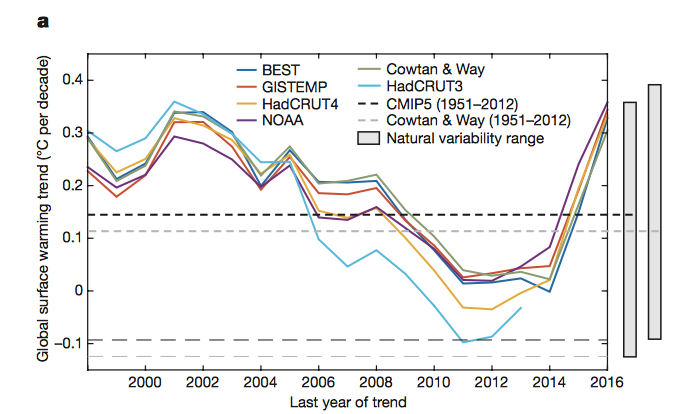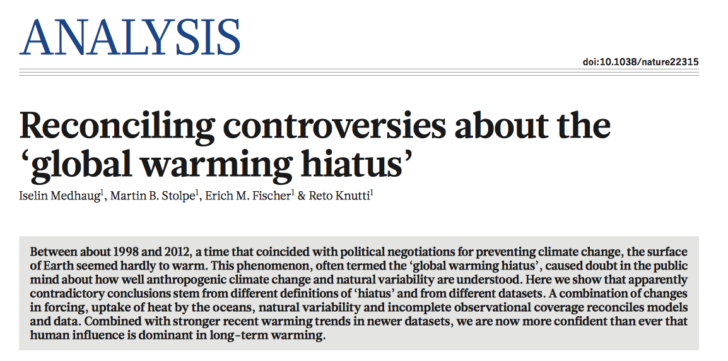Of course… it means nothing that even the manipulated temperature data declined while greenhouse gas levels increased substantially — and that it took an El Nino to reverse the downward trend. Why learn from observations? At least they admit there was a pause.

The media release and abstract are below.
###
Climate sciences: Explaining discrepancies in ‘global warming hiatus’ observations (N&V)
The ‘global warming hiatus’ that occurred between about 1998 and 2012 does not change our understanding of the influence of human activity on long-term warming, reports an Analysis in Nature this week.
Iselin Medhaug and colleagues review literature and reassess various models and observational evidence gathered since the so-called hiatus. During this period (1998–2012), Earth’s surface temperature did not seem to rise as expected from climate projections, and some models and observations seemed to be contradictory. These phenomena raised questions about our understanding of the climate system, at least in some quarters, including how well anthropogenic climate change and natural variability are understood. However, the authors find that different conclusions mostly result from the use of different datasets, different time periods and different definitions of a hiatus period. They demonstrate that, with appropriate treatment of models and observations, discrepancies can be reconciled.
More recent observations demonstrate that despite the apparent hiatus, the climate is continuing to warm, with 2015 and 2016 being the two warmest years on record. The authors conclude that the hiatus does not contradict our overall understanding of the climate system.
“Perhaps the most salient lesson to be learnt from work on the pause is the need for clarity of definition and for quantifiable, generalizable accounts of the alleged phenomenon,” writes James Risbey in an accompanying News & Views article. “Our definitions, like our tools, need sharpening if they are to sustain claims about unusual climate events.”
###

“Don’t confuse us with facts! Our head is made up!”
Believing something- against the best evidence, with only models to back it up – is not an “understanding.”
…with appropriate treatment of models and observations, discrepancies can be reconciled”.
In other words, “torture the data until you get the desired result”. If you “adjust” the curvature of the earth to zero, you can “prove” that the earth is flat.
The people who write these ridiculous articles are just plain stupid. The “peer-reviewed” journals that publish their nonsense risk losing what little respect and credibility they have left.
I was taught as a child that simply not knowing something is called ‘ignorance’, and there is no shame in that. It is when you have access to knowledge, but you refuse to learn, that you cross the line into shameful ‘stupidity’. Changes in understanding come with learning.
Regarding: “More recent observations demonstrate that despite the apparent hiatus, the climate is continuing to warm, with 2015 and 2016 being the two warmest years on record.”
How convenient. The authors pick the peak of the 1998 very strong ENSO as their “starting point” and the peak of the very strong ENSO of 2015-2016 as their “end point”…
Apparently, the authors conveniently ignore the fact that in the intervening years (2001 through 2014) their infamous “greenhouse warming” model failed as the warming trend became a cooling trend!
One has to wonder, in claiming “2015 and 2016 [were] the two warmest years on record” did they use the “cooked” historical data to exaggerate their claim, or was the real raw historical data used?
Excellent reasons to ignore anything Nature pronounces on this subject!